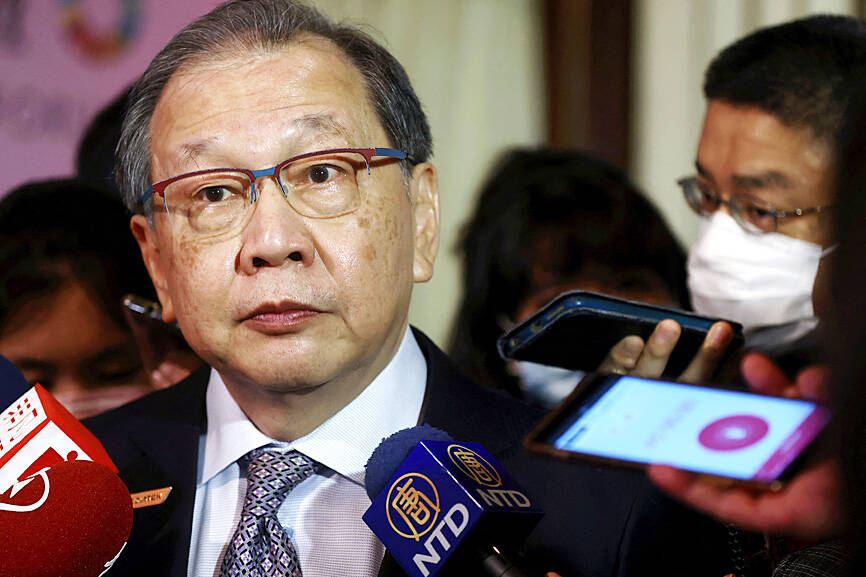Tensions between the US and China are causing some manufacturers to discuss moving some of their supply chain away from Taiwan, although the pace is “incremental,” Reuters reported yesterday, citing MediaTek Inc (聯發科) chief executive officer Rick Tsai (蔡力行).
Some of the “very large [equipment manufacturers] will require their chip suppliers to have multiple sources, like from Taiwan and from US, or from Germany or from Europe,” Reuters quoted Tsai as saying on the sidelines of a media and analyst event the Taiwanese handset chip designer hosted in California on Friday.
“I think in those cases, we will have to find multiple sources for the same chip if the business warrants that,” Tsai said.

Photo: Ann Wang, Reuters
Reuters said MediaTek’s most advanced smartphone chips are made at Taiwan Semiconductor Manufacturing Co’s (TSMC, 台積電) plants in Taiwan, with some older smartphone chips being made by GlobalFoundries Inc in the US and Singapore.
The company in July announced that it had formed a strategic partnership with Intel Corp to manufacture chips using the US company’s matured process technology.
With TSMC constructing a US$12 billion plant in Arizona, MediaTek would also be producing chips there when it begins production, Tsai said.
However, he cautioned that it was not realistic for the semiconductor industry to move completely away from Taiwan, which produces most of the world’s advanced semiconductors, Reuters said.

SELL-OFF: Investors expect tariff-driven volatility as the local boarse reopens today, while analysts say government support and solid fundamentals would steady sentiment Local investors are bracing for a sharp market downturn today as the nation’s financial markets resume trading following a two-day closure for national holidays before the weekend, with sentiment rattled by US President Donald Trump’s sweeping tariff announcement. Trump’s unveiling of new “reciprocal tariffs” on Wednesday triggered a sell-off in global markets, with the FTSE Taiwan Index Futures — a benchmark for Taiwanese equities traded in Singapore — tumbling 9.2 percent over the past two sessions. Meanwhile, the American depositary receipts (ADRs) of Taiwan Semiconductor Manufacturing Co (TSMC, 台積電), the most heavily weighted stock on the TAIEX, plunged 13.8 percent in

A wave of stop-loss selling and panic selling hit Taiwan's stock market at its opening today, with the weighted index plunging 2,086 points — a drop of more than 9.7 percent — marking the largest intraday point and percentage loss on record. The index bottomed out at 19,212.02, while futures were locked limit-down, with more than 1,000 stocks hitting their daily drop limit. Three heavyweight stocks — Taiwan Semiconductor Manufacturing Co (TSMC, 台積電), Hon Hai Precision Industry Co (Foxconn, 鴻海精密) and MediaTek (聯發科) — hit their limit-down prices as soon as the market opened, falling to NT$848 (US$25.54), NT$138.5 and NT$1,295 respectively. TSMC's

TARIFFS: The global ‘panic atmosphere remains strong,’ and foreign investors have continued to sell their holdings since the start of the year, the Ministry of Finance said The government yesterday authorized the activation of its NT$500 billion (US$15.15 billion) National Stabilization Fund (NSF) to prop up the local stock market after two days of sharp falls in reaction to US President Donald Trump’s new import tariffs. The Ministry of Finance said in a statement after the market close that the steering committee of the fund had been given the go-ahead to intervene in the market to bolster Taiwanese shares in a time of crisis. The fund has been authorized to use its assets “to carry out market stabilization tasks as appropriate to maintain the stability of Taiwan’s

In a small town in Paraguay, a showdown is brewing between traditional producers of yerba mate, a bitter herbal tea popular across South America, and miners of a shinier treasure: gold. A rush for the precious metal is pitting mate growers and indigenous groups against the expanding operations of small-scale miners who, until recently, were their neighbors, not nemeses. “They [the miners] have destroyed everything... The canals, springs, swamps,” said Vidal Britez, president of the Yerba Mate Producers’ Association of the town of Paso Yobai, about 210km east of capital Asuncion. “You can see the pollution from the dead fish.